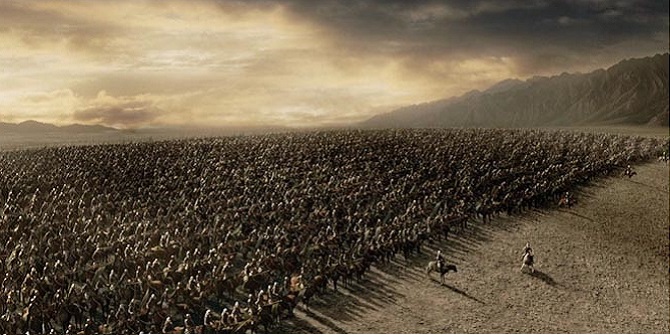Is it the job of the journalist to stop a genocide? What is the role of news media in actually fanning flames of hatred? Can we ever report honestly on the complexity of ethnic conflict and subsequent attempts at reconciliation?
There is no more painful case study for these difficult questions than the genocide in Rwanda in 1994 so just to have a serious and sensitive discussion is, I feel an achievement.
There was no sign of compassion fatigue at the Polis debate on Rwanda, genocide and the media. We had to turn people away from a packed hall that heard from two genocide survivors: Patrick Iregura and Serge Rwigamba and from Channel 4 News’ Lindsey Hilsum, who was there in 1994.
Serge Rwigamba gave a quiet but searing account of his own family’s appaling loss and his nightmarish vision as a child of watching friends and family butchered before his eyes. 15 out of 20 close family members were killed.
Patrick Iregure posed some simple open questions about the role of the news media. Why were the warnings ignored? how can international media turn away? how can international and local media report on a slow and complicated process like the reconciliation and justice policy in Rwanda? Why did the media pay so much sympathetic attention to the refugees who fled Rwanda, including so many perpetrators?
There were good questions from the audience, too. Does a journalist have a duty to campaign? Why don’t media organisations lobby governments direct? What difference do new media technologies make?
Channel 4 News’ Lindsey Hilsum was in Kigali when the genocide began working as a freelance journalist cum aid worker (thought it is clear that her skills and instincts are all the former rather than the latter).
She insisted that her outstanding reporting of the events at the time was actually ‘a failure’. Firstly, it was too dangerous to get out and report. But more importantly, it was beyond journalists’ comprehension that such a full-blooded pre-meditated genocide could really be happening at the end of the 20th century:
“We simply didn’t think about the idea of war crimes or genocide. That was something that happened to Jews, and perhaps to a degree in the Balkans or with Pol Pot…I didin’t use the word ‘genocide’ until the end of the month, for other journalists it took longer”.
Lindsey Hilsum described how she reported on what was happening:
“I didn’t go out because there were roadblocks everywhere with drunk men with red eyes and machetes. The phone didn’t stop ringing. It was my Tutsi friends calling me to say ‘they are at the door’ or ‘this is the last time I can talk to you’. I wrote down what they said as my reports, but I still didn’t join the dots to realise this was genocide.”
In the end Hilsum was able to get out disguised as a Red Cross worker and she witnessed the gutters running with blood and the child corposes with limbs hacked off.
She points out one of the terrible ironies of media coverage or the lack of it. Most of the African press corps were in South Africa at the time celebrating that country’s first free elections. It was a moment when people didn’t want to think about the dark side of Africa.
And the aftermath has been hugely problematic to report,too. I remember when I was a programme editor at Channel 4 News and Lindsey went back to report on the reconciliation process in Rwanda. She was much too honest a journalist not to spot the contradictions. Justice was often summary and arbitrary in the desperate attempt to bring closure to a battered population. And as she pointed out, some Tutsis actually benefited from the whole conflict as their businesses thrived as the Hutus fled. On the other hand, the gruesome stories of women raped – often by men with HIV – took longer to emerge, partly because they were understandably reluctant to talk.
So it is not surprising that a hugely intelligent and honest correspondent like Lindsey Hilsum can’t give the survivors like Patrick and Serge a reassuring answer.
Yes, said Lindsey, email, Twitter and the rest can help alert the world. Yes, journalists should do everything to tell people what is going on. But she does not believe that journalists rather than governments set the agenda. In the end it is about politics not the media.
We will have a fuller report on this event at a later date.




Dear Charlie, thank you for organising this truly significant event. Patrick was right in pointing out that education is a fundamental element in the long and incredibly complex process of reconciliation. As a follow up issue, I’d be interested to know what is the current level of integration among hutu and tutsi children and how the genocide is presented, both at grassroots level and via official channels, to the new generations, those who did not witness it first hand. What is the current official outline of the history that led to those events and does it also cover the colonial blunders that contributed to this ethnic time bomb (i.e. the introduction of the ID cards along with highly questionable anthropological theories)? Thank you.
Luca – the history textbooks are currently being rewritten:
http://allafrica.com/stories/200909070367.html